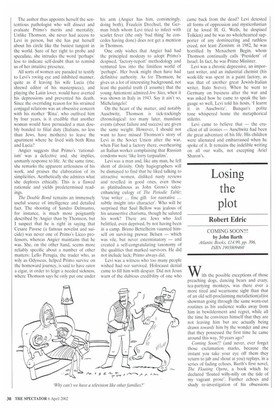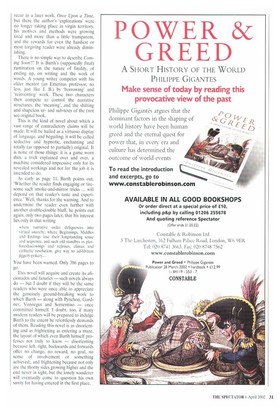Losing the plot
Robert Edric
COMING SOON!!! by John Barth Atlantic Books, £14.99, pp. 396, ISBN 1903809460 With the possible exceptions of those preaching dogs, dancing bears and crazy, tea-partying monkeys, was there ever a more tired and wearisome sight than that of an old self-proclaiming metafiction(apist showman going through the same worn-out routines as his audience walks away from him in bewilderment and regret, while all the time he convinces himself that they are not leaving him but are actually being drawn towards him by the wonder and awe that they possessed the first time he came around this way, 50 years ago?
Coming Soon!!! (and never, ever forget those exclamation marks, because the instant you take your eye off them they return to jab and shout at you) replays, in a series of fading echoes, Barth's first novel, The Floating Opera, a book which he declared 'floated willy-nilly on the tide of my vagrant prose'. Further echoes and shady re-investigation of his obsessions
recur in a later work, Once Upon a Time, but there the author's 'explorations' were no longer taking place in virgin territory, his motives and methods were growing tired and more than a little transparent, and the rewards for even the hardiest or most forgiving reader were already diminishing.
There is no simple way to describe Coming Soon!!! It is Barth's (supposedly final) rumination on the nature of finality, of ending up, on writing and the work of words. A young writer competes with his older mentor (an Emeritus professor, no less, just like J. B.) by 'borrowing' and 'reinventing' work. These two characters then compete to control the narrative structures, the 'meaning', and the shifting and shapeless urand sub-texts of the (not so) original book.
This is the kind of novel about which a vast range of contradictory claims will be made. It will be hailed as a virtuoso display of language, and beguiling; it will be called seductive and hypnotic, enchanting and totally (as opposed to partially) original. It is none of those things: it is a game worn thin, a trick explained over and over, a machine considered impressive only for its revealed workings and not for the job it is intended to do.
As early as page 11, Barth points out, 'Whether the reader finds engaging or tiresome such smoke-and-mirror tricks ... will depend on that reader's taste and experience.' Well, thanks for the warning. And to undermine the reader even further with another double-double bluff, he points out again, only two pages later, that his interest lies only in that writing
where narrative order deliquesces into virtual anarchy; where Beginnings, Middles and Endings lose their longstanding sense and sequence. and such old standbys as plotforeshadowings and reprises, climax and cathartic resolution, give way to ad-libitum j iggery-pokery...
You have been warned. Only 386 pages to go.
This novel will acquire and create its aficionados and fanatics — such novels always do — but I doubt if they will be the same readers who were once able to appreciate the genuinely ground-breaking work to which Barth — along with Pynchon, Gardner, Vonnegut and Sorrentino — once committed himself. I doubt, too, if many modern readers will be prepared to indulge Barth to the extent he relentlessly demands of them. Reading this novel is as disorienting and as frightening as entering a maze, the layout of which even Barth himself professes not truly to know — disorienting because left, right, backwards and forwards offer no change, no reward, no goal, no sense of involvement or something achieved;, and frightening because not only are the thorny sides growing higher and the end never in sight, but the lonely wanderer will eventually come to question his own sanity for having entered in the first place.































































 Previous page
Previous page